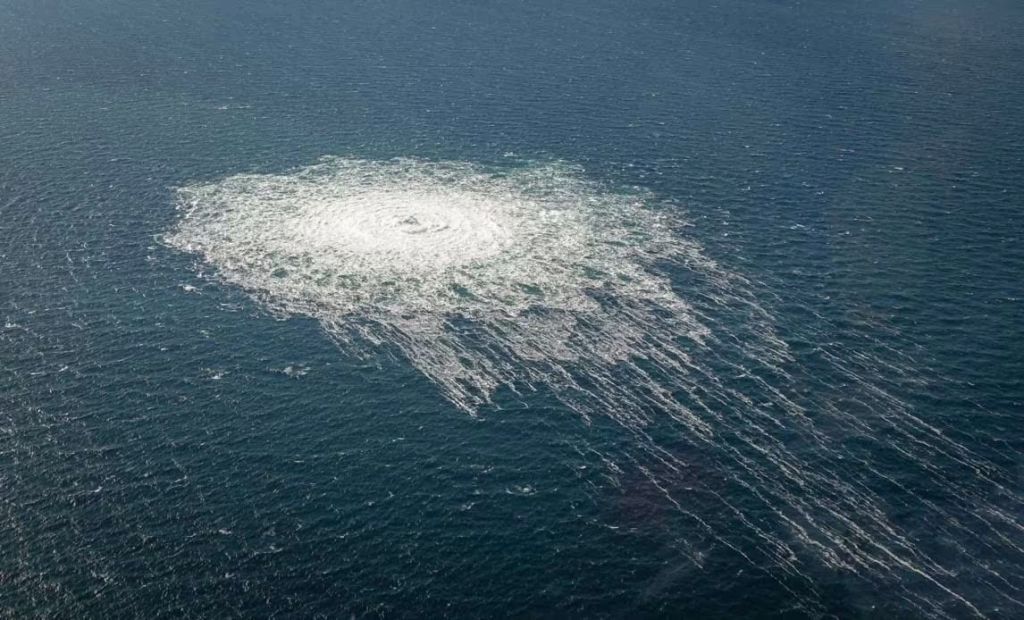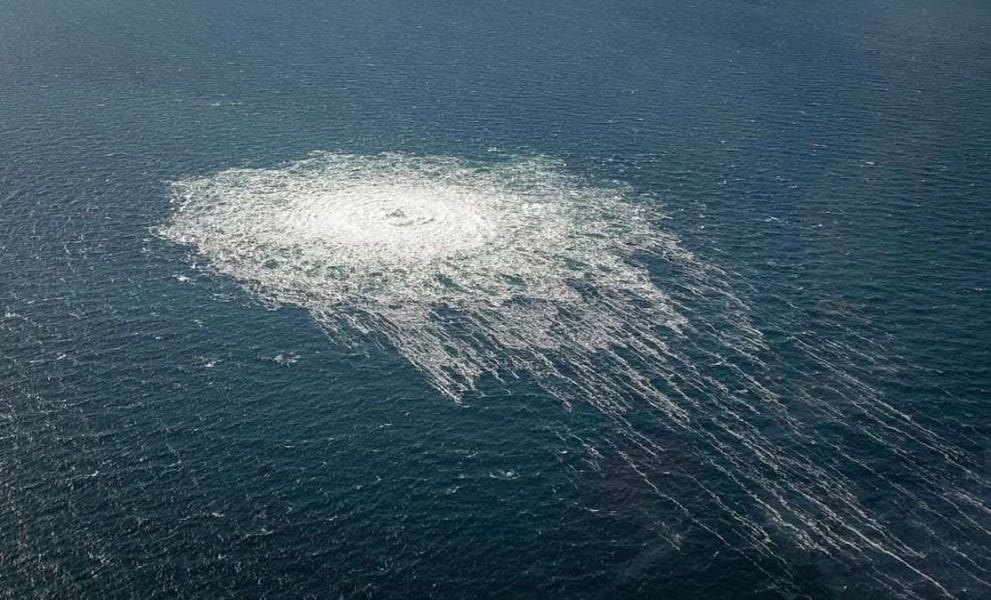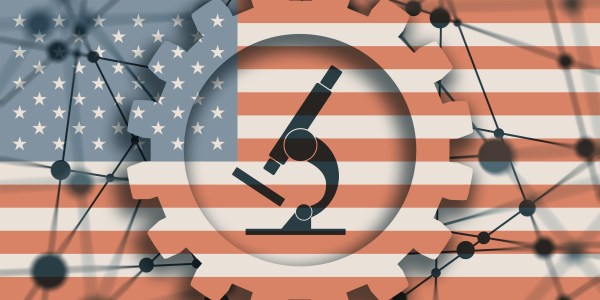Happy Wednesday! McDonald’s announced yesterday it’s partnering with streetwear brand Cactus Plant Flea Market to offer limited-edition Happy Meals for adults, complete with a collectible figurine inside every box. At last, a chance for adults to be happy too!
Quick Hits: Today’s Top Stories
-
Russian-installed officials in four partly-occupied regions of Ukraine reported that residents had voted—in staged referendums conducted under the threat of violence—in favor of joining Russia. Meanwhile, nearly 100,000 Russians have crossed into Kazakhstan since Russian President Vladimir Putin announced partial mobilization to recruit new troops for the war in Ukraine. Kremlin spokesman Dmitry Peskov on Monday acknowledged compliance problems with the mobilization, as Russians have burned recruitment offices and one man shot a draft officer.
-
The Nord Stream 1 and 2 natural gas pipelines connecting Russia and Europe are leaking into the Baltic Sea in three places after a series of explosions earlier this week that some European officials claimed were “sabotage,” likely by Russia. The pipelines weren’t currently shipping fuel to Europe for reasons related to Russia’s war in Ukraine, but now they may not be able to even if geopolitical circumstances change.
-
Hurricane Ian strengthened to a Category 3 storm Tuesday and is forecast to reach Category 4 as it nears Florida today after causing a total power outage in Cuba. Gov. Ron DeSantis estimated 2.5 million Floridians were under evacuation orders Tuesday, and the storm’s outer bands spawned tornadoes along Florida’s east coast last night.
-
Citing the authority vested in him by the Immigration and Nationality Act, President Joe Biden informed Congress on Tuesday he will hold the United States’ refugee cap steady at 125,000 for fiscal year (FY) 2023. Biden raised the cap to 125,000 for FY 2022—up from a record-low cap of 15,000 set by the Trump administration for FY 2021—but less than 20,000 refugees had been admitted under the program as of July. That tally, however, does not include the nearly 200,000 Ukrainian and Afghan refugees the United States has admitted through humanitarian parole.
-
As Andrew reported on the site yesterday, the Pacific Legal Foundation filed a lawsuit against the Department of Education Tuesday in an effort to block the agency’s attempt to unilaterally forgive hundreds of billions of dollars in student debt. Legal experts had questioned whether anyone would be able to find standing to sue; the lawsuit’s plaintiff is an attorney with outstanding student loans who claims he will be hit with additional state taxes as a result of the Biden administration’s program.
-
Senate Minority Leader Mitch McConnell announced Tuesday he will support a bipartisan bill reforming the Electoral Count Act of 1887, increasing the odds that the legislation—which seeks to prevent another January 6 by clarifying Congress’ role in certifying electoral results—will become law.
-
A report from the Treasury Inspector General for Tax Administration published Tuesday found that, although the Internal Revenue Service was 98 percent accurate in issuing expanded child tax credit payments between July and November 2021, the agency sent $1.1 billion in payments to 1.5 million taxpayers who weren’t eligible for them and did not send $3.7 billion in payments to 4.1 million taxpayers who were.
-
The Commerce Department reported Tuesday that new orders for durable goods—products like appliances, computers, and machinery intended to last three or more years—fell a seasonally adjusted 0.2 percent from July to August, and 0.9 percent excluding defense orders. The measure has decreased in two consecutive months after increasing in nine of the previous ten, signaling a potential dropoff in demand as the Federal Reserve seeks to curb inflation.
Nord Stream Go Boom

Spare a thought for Baltic fish today. On Monday, two explosions reverberated through that sea—the second as strong as a magnitude 2.3 earthquake—and the water began roiling in circles from 200 meters to a kilometer across, as though Pirates of the Caribbean-style monsters were rising from the briny deep. But the culprit was no kraken: the Nord Stream natural gas pipelines had sprung three leaks and the fuel inside was bubbling up to the surface.
“Sprung a leak” could imply an accident, but that isn’t what officials believe happened. Multiple seismology networks ruled out an earthquake as a cause, and the fact that Nord Stream 1 and 2 were separately affected—within hours—makes an accident awfully unlikely. Plus, the pipes are thick and coated in concrete, built to avoid just such leaks. Nord Stream AG, the company that operates the pipeline, called the damage “unprecedented.”
European leaders didn’t provide evidence but were quick to declare foul play. Sweden’s acting Prime Minister Magdalena Andersson said “it is probably a case of sabotage,” and cited Norway’s reports of increased drone activity near energy production facilities, potentially reconnaissance for attacks. “They were not caused by natural occurrences or events or material fatigue,” German Economy Minister Robert Habeck said. Danish Prime Minister Mette Frederiksen agreed: “These are deliberate actions, not an accident.”
United States Secretary of State Antony Blinken was more circumspect, acknowledging initial reports suggested sabotage, but making clear the administration hadn’t yet confirmed that.
Others showed no such restraint. “We faced an act of sabotage,” Polish Prime Minister Mateusz Morawiecki said. “We don’t know all the details of what happened, but we see clearly that it’s an act of sabotage, an act that probably marks another step in the escalation of the situation in Ukraine.” Ukrainian presidential adviser Mykhailo Podolyak went ahead and named names, calling the leaks “a terrorist attack planned by Russia”—though, again, without offering any evidence. Kremlin spokesman Dmitry Peskov called for an investigation and didn’t rule out sabotage—though he offered no details on who might have committed it.
While we wait for details, there’s plenty of speculation about the leaks—good faith and bad. As Andrew Fink reports on the site today, a recent forged RAND Corporation memo suggests bad actors may be hoping to falsely pin energy disruption on the United States. Russia sympathizers—and Fox News host Tucker Carlson—have shared a months-old clip of President Joe Biden threatening to shut down Nord Stream 2 (via sanctions) as evidence the U.S. may have been involved in an attack on the pipeline.
The leaks won’t immediately disrupt Europe’s fuel supply, since Russia had cut off flow through Nord Stream 1 and sanctions had prevented Nord Stream 2 from ever coming online. But the damage does pretty much guarantee that those pipelines won’t carry fuel anytime soon. “The multiple undersea leaks mean neither pipeline will likely deliver any gas to the EU over the coming winter, irrespective of political developments in the Ukraine war,” Eurasia Group analysts wrote in a note. But the more immediate threat to Europe’s energy security may be the shot across the bow that Russian state-controlled gas giant Gazprom fired Tuesday, warning that a legal dispute over payments could result in Russia sanctioning Naftogaz Ukraine. The move has the potential to end the shipment of Russian gas through Ukraine, eliminating yet another vehicle through which European countries can meet their energy needs.
The leaks are in international water, so even intentional sabotage would not be considered a declaration of war against any NATO members. But combined with Gazprom’s threat, the development is certainly rattling Europe’s already fraught energy markets, causing European benchmark natural gas futures to rise as much as 22 percent Tuesday. It would also, if not accidental, represent a giant finger in the West’s environmental eye. The leaks are releasing enormous amounts of methane—a potent greenhouse gas—into the atmosphere, and will be expensive to clean up. Kristoffer Böttzauw, the head of Denmark’s Energy Agency, said it could take as long as a week for gas to stop draining from Nord Stream 2, and ships will need to steer clear of the area until the risk of additional explosions subsides. Worried about additional attacks, Norwegian and Danish officials have called for extra vigilance and security at gas and electric facilities.
“If it is Russia—which seems likely—the motivation [is] to show the West that it can do anything it likes,” Elisabeth Braw, a senior fellow at the American Enterprise Institute who studies “gray-zone” attacks that stop short of open warfare. “There’s nothing those countries can do about it because they’re clearly being harmed, but it’s not as serious as an act of war.”
An Electoral Count Act Update
We don’t want to alarm you, but Congress is on the verge of doing something useful.
Over the past several months, lawmakers 1) identified a problem, 2) created a bipartisan working group to discuss the problem and potential solutions, 3) invited subject-matter experts to provide input on the problem and potential solutions, 4) proposed legislation addressing the problem, 5) held a committee hearing to discuss the proposed legislation, and 6) tweaked the proposed legislation in response to constructive feedback.
We’re talking, of course, about Electoral Count Act reform, which took two important steps toward final passage on Tuesday: The Senate Rules Committee voted 14-1 to advance the legislation, and Senate Minority Leader Mitch McConnell formally endorsed the agreement.
“Clearly when a 150-year-old law has successfully brought us certainty, finality, and one orderly presidential inauguration after another, we need to be delicate and careful with any changes,” the Kentucky Republican said yesterday. “But the chaos that came to a head on January 6 of last year strongly suggests that we find careful ways to clarify and streamline the process.” He also cited efforts from a smattering of Democrats in January 2001, January 2005, and January 2017 to object to Republican presidential victories.
It’s been about two months since a bipartisan group of senators—led by Republican Susan Collins of Maine and Democrat Joe Manchin of West Virginia—introduced the Electoral Count Reform and Presidential Transition Improvement Act in the hopes of creating “clear guidelines for our system of certifying and counting electoral votes for President and Vice President.” We outlined what the legislation would do in a late-July TMD:
The legislation accounts for performative grandstanding by raising the threshold to lodge objections to a state’s electors, from just one senator and one representative to at least 20 percent of both chambers. It also makes clear that the vice president’s role on January 6 is purely “ministerial,” and that he or she is unable to “solely determine, accept, reject, or otherwise adjudicate disputes over electors.” To avoid competing slates of electors, the legislation designates each state’s governor as the official responsible for submitting that ascertainment to Congress—unless otherwise specified in the state’s laws or constitution—and prevents state legislatures from retroactively changing how electors are selected after the voting has taken place. It also would grant presidential candidates access to expedited judicial review; challenges to a state’s slate of electors would be heard by a three-judge panel, and that panel’s ruling could be appealed directly to the Supreme Court.
Senators have introduced and adopted a few minor tweaks to that framework since late July, but the bigger development over the past two months is that the House voted to pass its own, slightly different version of the legislation. Introduced earlier this month by Reps. Zoe Lofgren and Liz Cheney—both members of the January 6 Select Committee—the Presidential Election Reform Act sets out to address the same set of issues as its Senate counterpart, but differs in a few areas on how to go about it. Rather than 20 percent of both chambers needed to sustain an objection, for example, the House bill would require 33 percent. And as Andy Craig noted for the Cato Institute last week, the House version of the legislation is generally more aggressive “constraining the various actors involved in the presidential election process.”
That was the stated reason many House Republicans provided when voting against the measure last week; the unstated reason generally involved an unwillingness to upset a certain Florida resident and his supporters. The legislation passed 229-203, with just nine Republicans—none of whom are returning to Congress next year—voting in favor.
For that reason, McConnell made clear on Tuesday that the House version of the legislation was dead on arrival, and any eventual compromise would have to hew closer to the more “modest” Senate proposal.
“It is clear that only a bipartisan compromise originating in the Senate can actually become law. One party going it alone would be a non-starter,” he said. “Our colleagues left chaos-generating bad ideas on the cutting room floor—like a massive federal takeover of election law, or inventing new causes of action for litigation that would throw every election into the courts. The legislation before us, with this text, in this form, is Congress’ one option to get an outcome.”
More than ten Senate Republicans have now voiced their support for the Collins bill publicly, meaning that—as long as Democrats don’t start defecting—GOP opponents of the legislation won’t be able to sustain a filibuster. And with McConnell now on board, it likely won’t be particularly close. Even Sen. Rand Paul—no establishment squish—has expressed openness to the reform, as Haley noted in Friday’s Uphill (🔒). Sen. Ted Cruz was the only member of the Rules Committee to oppose advancing the proposal on Tuesday.
Senate leadership has not yet set a date for a final vote on the proposal, but the process—which will involve reconciling differences between the House and Senate versions—is now expected to bleed into the lame duck period between November’s midterm elections and a new Congress being sworn in in January.
Worth Your Time
-
A BP ship loaded with fuel is idling off the coast of Puerto Rico, while nearly a million people on the island remain without power in the wake of Hurricane Fiona. Thanks, Jones Act! In a piece for Reason, Scott Shackford lambasts the century-old legislation requiring ships delivering goods between U.S. ports be made in America, owned by American companies, and crewed by Americans. “In the case of an emergency or disaster, it is difficult to respond quickly because there aren’t all that many Jones Act-compliant ships,” he notes. “Whenever a crisis comes around that involves shipping, this law that supposedly helps America has to be temporarily suspended or bypassed in order to handle it. … The impact is felt most keenly on the outer edges of America’s territory, places like Alaska, Hawaii, and Puerto Rico that are most dependent on ocean shipping to receive goods. The law by its very nature drives up the costs.”
-
The United Kingdom’s recent economic woes have been partly caused by British Prime Minister Liz Truss, like many U.K. policymakers, forgetting Britain isn’t America, Jonan Ganesh writes in the Financial Times. “So much of what Britain has done and thought in recent years makes sense if you assume it is a country of 330mn people with $20tn annual output,” Ganesh notes, arguing that sharing the English language allows British politicos to easily get caught up in American policy ideas that won’t work for a much smaller economy and population. “Take her vaunted supply-side revolution. Like all armchair free-marketeers (she has never set up a business) she believes her nation is a blast of deregulation away from American levels of entrepreneurial vim. It isn’t. The creator of a successful product in Dallas can expand to [Los Angeles] and Boston with little friction. The U.K. doesn’t have a market of hundreds of millions of people.”
-
Your random acquaintances—the distant coworker, the friend of the college roommate—may be more helpful than your close friends in finding your next job, a new study using LinkedIn data suggests. Researchers were looking to test the theory that weak ties allow people to come into contact with more opportunities and ideas than they reach by sticking with their close circle. By switching up what types of possible contacts LinkedIn suggested to different groups of users, the researchers found in the five-year study of 20 million people that those receiving more weak tie recommendations had higher job mobility. “A practical implication of the research is that it’s helpful to reach out to people beyond your immediate friends and colleagues when looking for a new job,” Stanford University professor Erik Brynjolfsson said. “People with whom you have weaker ties are more likely to have information or connections that are useful and relevant.”
Presented Without Comment
Also Presented Without Comment
Also Also Presented Without Comment
Toeing the Company Line
-
In this week’s edition of The Sweep (🔒), Audrey and Sarah highlight Blake Masters’ lackluster fundraising in Arizona, dive into what partisan primary turnout means for the general election, and preview all the upcoming Senate debates. “This season, candidates in most Senate battlegrounds are participating in only one general election debate,” they note, “if they’re agreeing to debate at all.”
-
Remember the Uyghur Forced Labor Prevention Act? Haley does, and in Tuesday’s Uphill provides an update on enforcement, reporting that customs has blocked about $420 million worth of imports but that enforcement gaps remain.
-
Tuesday brought us another Dispatch Live (🔒) potpourri, kicking off with a musical ABC’s performance and featuring Sarah, Jonah, Declan, and Andrew discussing student loan forgiveness and U.S. higher education overall. Plus: why the January 6 committee has delayed its final hearing. Dispatch members who missed the conversation can catch a rerun—either video or audio-only—by clicking here.
-
Jonah’s long quest to find and interview a rodentologist has, at last, reached its end: the latest episode of The Remnant features Fordham University’s Dr. Michael Parsons answering your every question about rat culture, their feelings on humans, and why some cities just can’t get rid of them.
-
We’ve got quite the lineup on the site today: Nick Catoggio on whether neighboring countries should take in fleeing Russian conscripts, Kevin Williamson on the crashing British pound, Andrew Egger on the fight over Kentucky’s proposed anti-abortion constitutional amendment, Andrew Fink on Russian propagandists using forged documents to blame the U.S. for the NordStream leaks, and Jonah’s latest column imagining a world in which the GOP had nominated more boring candidates in swing states this year.
Let Us Know
Hailing from Chicago and Maine, your TMD authors have never experienced a hurricane in earnest. Have you ever found yourself caught in such a storm? What do you remember about the experience?
Sending prayers and best wishes to all our readers affected by Ian this week.







Please note that we at The Dispatch hold ourselves, our work, and our commenters to a higher standard than other places on the internet. We welcome comments that foster genuine debate or discussion—including comments critical of us or our work—but responses that include ad hominem attacks on fellow Dispatch members or are intended to stoke fear and anger may be moderated.
With your membership, you only have the ability to comment on The Morning Dispatch articles. Consider upgrading to join the conversation everywhere.